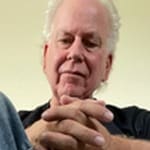“Why am I afraid to die?”
My guess is at least half of the folks reading this are afraid of dying. And it’s a double whammy because fearing death generates fear in living. We can’t let that happen. The fear of death: what is it? And how do we get a handle on it?
‘I do not fear death. I had been dead for billions of years before I was born, and had not suffered the slightest inconvenience from it.’ Mark Twain
In the 1942 Charlie Chan film Castle in the Desert, there’s a scene in which Madame Saturnia tells Chan he has enemies.
She goes on to say, “I see death reaching for you – like an arrow.” Chan calmly replies, “Man who fears death die a thousand times.”
Intro
In clinical circles, the fear of death (or dying) is known as thanatophobia. The origin of the word is in Greek mythology. Thanatos was the personification of death. Interestingly enough, he was often referred to, but rarely appeared in person.
I’d like you to keep two questions forward in your thinking throughout the read: Do you fear death? And if so, how does it generate fear in living?
Hmm, fear of death generating fear in the very thing that prevents it.
Let’s get busy…
What is the fear of death?
Though it may seem obvious, what exactly is the fear of death?
Very simply, it’s an existential phobia that produces symptoms such as anxiety, dread, apprehension, depression, and more when thinking about one’s death, the process of dying, or ceasing to exist.
All of the above may also be generated by the fear of death of someone we love.
It’s normal to occasionally fear death. But if the fear causes consistent interruptions to one’s daily routine, it’s time to reach out for help.
My personal experience
I’m curious, have you felt any measure of mood-dipping or anxiety-spiking since you began reading the piece? I got the willies more than once while researching and writing it.
And it goes deeper…
I’ve wrestled with the fear of death, off and on, throughout my adult life. Sometimes I visualize “the moment.” You know, what will it be like when it’s time to go – assuming I’m in a controlled setting and in possession of my marbles.
Funny, I have an age in mind (but I’m not telling). Do you?
A recurring dream
I even have a recurring dream about death. The setting varies, but suddenly it’s somehow revealed that the world is coming to an end in minutes. How isn’t made clear, though I often believe it’s eschatological in nature.
So there I am, stunned then dissociated, looking for signs the event’s going down. I wonder how it’ll happen, even visualizing what I hope is a fascinating transition to a heavenly “other side.” However, the dreams never get there.
Do you think or dream about things like that?
Coming up on 70 big ones, I still have fearful thoughts about death; however, they’re less frequent and intense. That’s common with aging, by the way.
“The Great Gig in the Sky”
So according to one of the background voices (the doorman at Abbey Road Studios) on Pink Floyd’s “The Great Gig in the Sky.” it all comes down to this…
And I am not frightened of dying. Any time will do, I don’t mind. Why should I be frightened of dying? There’s no reason for it – you’ve got to go sometime.
I guess it can really be that simple.
What causes the fear of death?

“It’s upset me for so long. I need to find a way to make peace with my fear of death.”
As with any emotional or mental misery, confirmed causes can be tough to come by. Let’s take a look at some interesting possibilities.
Religiosity appears to play a role, but maybe not in the way you think. Studies have found that those with stronger religiosity, regardless of culture or religion, have a stronger fear of death. Non-believers and very religious people feared death less.
Physical health is a player as well. People with better physical health tend to fear death less. Does that apply to emotional and mental health? I’m thinking it does.
Psychotheorists
Sigmund Freud believed fear of death was a cover for unresolved childhood conflicts. No surprise there.
Erik Erikson chimed in with “ego integrity,” which is achieved when we find meaning or purpose after a thorough late-adulthood life review. He proposed that those who have achieved ego integrity have much lower levels of “death anxiety.”
Terror management theory and denial
Terror Management Theory (TMT) was developed by social psychologists Jeff Greenberg, Tom Pyszczynski, and Sheldon Solomon – based upon the ideas of cultural anthropologist Ernest Becker.
Becker suggested that death anxiety is not only extremely real, it’s our dominant issue of concern.
It’s so powerful and influential that it can generate fears and phobias of everyday life. Furthermore, according to Becker, one’s daily behavior consists of attempts to deny death and to keep anxiety under strict management.
Denial is the most common tool for putting the kibosh on the reality of death. We incorporate all sorts of mental mechanisms and physical actions – many beneath conscious awareness – in our effort to protect ourselves.
Small doses of denial are to be expected. But when it goes over the top, the emotional cost is tremendous.
Where are you with denial?
How do you treat the fear of death?
The first thing any of us can do to manage the fear of death is come to grips with the fact that we’re going to die. That’s just the way it goes. And no matter how it happens, when it’s over, it’s over. Pain, suffering, regrets of leaving loved ones and friends – gone.
It’s kind of like dreading a procedure requiring anesthesia. Just get yourself to the IV stick and we’re home free.
And keep in mind, we may be pleasantly surprised by what awaits us. My observation has always been, when looking at the sky, until someone can tell me exactly where it ends, I can only believe there’s much more to life and that which follows than “Boom, you’re dead.”
The meaning of life
We need to find and actively engage with the meaning of our lives. Sure, facing our mortality can be intimidating; however, a firm grasp on life meaning can help us get through it
If our fear of death has become unmanageable and is wreaking havoc in our lives, it’s time to contact a therapist. No shame, no hesitation.
One other point. We need to question and explore our major life beliefs – and the thoughts, feelings, and behaviors they generate. Often, what we believe to be the real issue is a cover for something entirely different, not to mention lodged more deeply within.
What a great opportunity
Fear of death, fear in living: what a paradox, right? And should we take on the challenge of untangling it, what a great opportunity to explore and grow.
How ‘bout some parting gifts…
“I do not fear death. I had been dead for billions of years before I was born, and had not suffered the slightest inconvenience from it.” Mark Twain
“As a day well spent brings happy sleep, so a life well spent brings happy death.” Leonardo da Vinci
“Our death is not an end if we can live on in our children and the younger generation. For they are us, our bodies are only wilted leaves on the tree of life.” Albert Einstein
“Fear not death for the sooner we die, the longer we shall be immortal.” Benjamin Franklin
“I’m not afraid of death because I don’t believe in it. It’s just getting out of one car, and into another.” John Lennon
“Don’t cry because it’s over. Smile because it happened.” Dr. Seuss
“To the well-organized mind, death is but the next great adventure.” J.K. Rowling
I grabbed several tidbits of info from a great article on Psychology Today: “Why We Fear Death and How to Overcome It” was written by Jade Wu, PhD. Highly recommended reading.
Staring at the Sun: Overcoming the Terror of Death by Irvin D. Yalom is another excellent read.
And those Chipur info and inspiration articles – I’d love it if you’d check ’em out (you might too).


After a decades-long battle with panic, generalized anxiety, fluctuating moods, and alcohol dependence; Bill finally found his life’s passion and work – lending a hand to those in the same boat. At age 49 he hit grad school and earned his counseling credentials. And he continues his service through Chipur and other projects.



